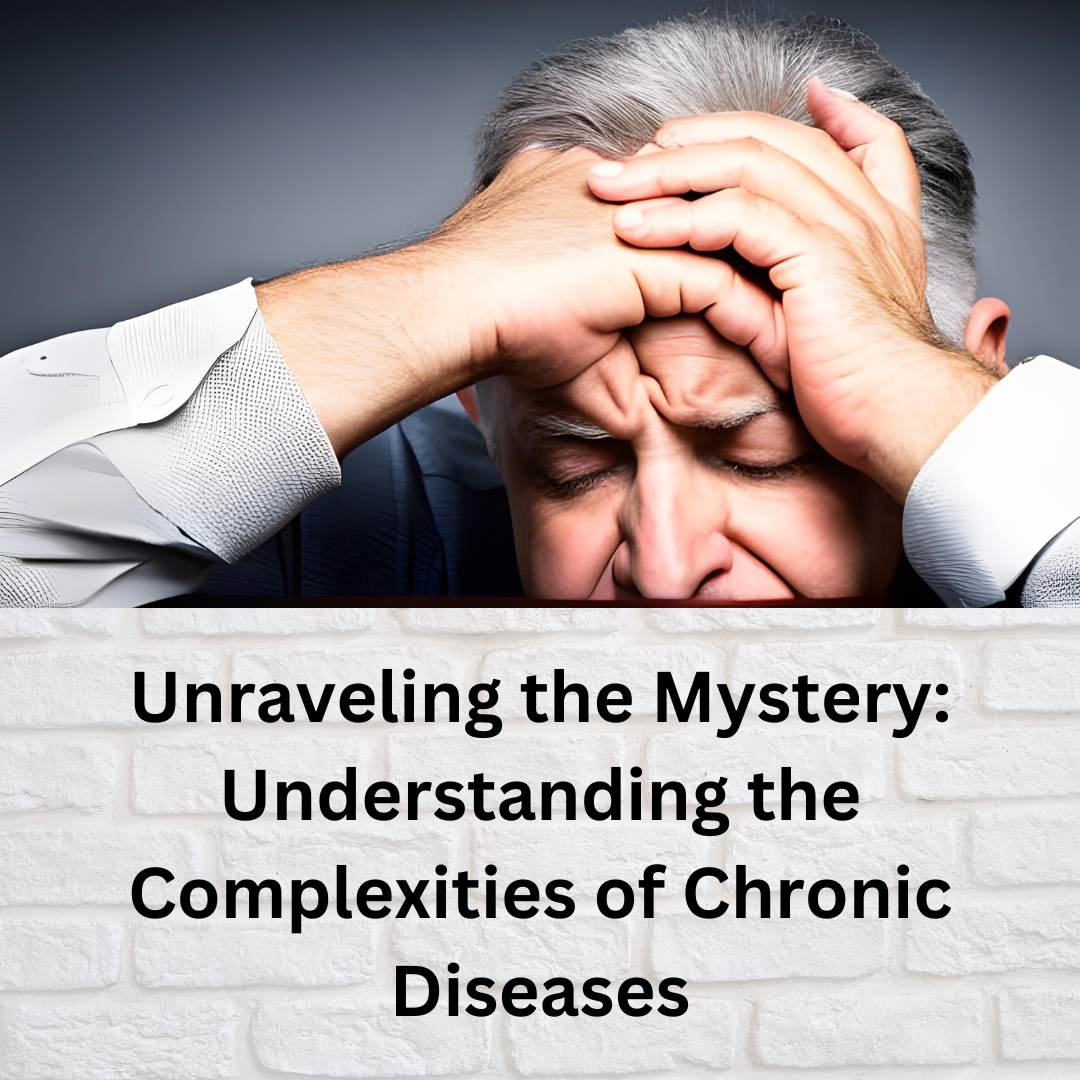As science continues to evolve, so too does our understanding of the complexities of chronic diseases. Despite the advancements in medical technology and research, chronic diseases remain a difficult mystery to unravel.
These long-lasting conditions often have multifaceted causes and symptoms, making them challenging to diagnose and treat. Moreover, chronic diseases can have a profound impact on a person's quality of life, as they require long-term management and care.
It is, therefore, vital that we gain a better understanding of these diseases to provide better healthcare and support to those affected by them.
In this blog post, we will delve into the complexities of chronic diseases to help debunk some of the myths surrounding them. We will explore the different types of chronic diseases, the factors contributing to their development, and the potential treatment options available.
Our goal is to provide a comprehensive overview of these complex conditions that affect millions of people worldwide. Through this post, we hope to empower our readers with knowledge that will support them in their health journeys.
Types of Chronic Diseases
Chronic diseases refer to a category of medical conditions that persist over an extended period, often requiring ongoing medical management. The World Health Organization (WHO) identifies several categories of chronic diseases, including those that affect the cardiovascular and respiratory systems, as well as those resulting from cancers, diabetes, and neurological disorders.
Many chronic diseases, such as heart disease, stroke, and cancer, are among the leading causes of death worldwide. While some chronic diseases can be prevented through healthy lifestyle choices, such as diet and exercise, others can develop due to genetic factors or exposures to environmental hazards.
As such, understanding the various types of chronic diseases is crucial in navigating the complexities of these medical conditions and developing strategies to prevent and manage them.
Causes of Chronic Diseases
Chronic diseases are the leading causes of morbidity and mortality worldwide. They persist for an extended period and can cause long-term damage to the body.
In recent years, there has been a significant increase in the prevalence of chronic diseases in populations across the globe. While the exact causes of chronic diseases are yet to be fully understood, several factors have been identified that contribute to their development.
Some of the leading risk factors include unhealthy behaviors like smoking, excess alcohol consumption, lack of physical activity, and a poor diet. These behaviors can lead to high blood pressure, high cholesterol, obesity, and other risk factors that increase the likelihood of developing a chronic disease.
Additionally, genetic predisposition and environmental factors such as pollution, exposure to toxins, and infections may also play a role in the development of these diseases. Understanding the various causes of chronic diseases is critical to effectively preventing and managing them.
Symptoms of Chronic Diseases
Chronic diseases can often present themselves through a range of subtle symptoms that may not appear to be immediately concerning. As such, it is crucial to be aware of the various potential signs that might point towards chronic disease.
Some of the more common symptoms of chronic illnesses include fatigue, weight loss or gain, difficulty sleeping, digestion issues, chronic pain, and shortness of breath.
While experiencing these symptoms does not necessarily indicate the presence of a chronic disease, it is vital to pay attention to ongoing or recurring symptoms and to discuss any such issues with a medical professional to determine the appropriate next steps.
Understanding the symptoms of chronic diseases is an essential step in identifying and managing these complex health issues.
Diagnosing Chronic Diseases
Diagnosing chronic diseases is a complex process that requires careful consideration of a multitude of factors. In order to arrive at an accurate diagnosis, healthcare professionals must take into account a patient's medical history, symptoms, physical exam findings, and laboratory test results.
In some cases, additional diagnostic tests such as imaging studies may be necessary. However, it is important to note that the diagnostic process for chronic diseases can be challenging, as many conditions share similar symptoms and there is often significant overlap between various diseases.
Therefore, healthcare providers must remain vigilant and diligent in their efforts to arrive at an accurate diagnosis, and may need to collaborate with specialists from other fields in order to properly address the unique needs of each patient.
Treatment Options for Chronic Diseases
Chronic diseases are complex conditions and thus require a long-term management plan. Treatment options for chronic diseases vary depending on the type of disease, severity, and individual patient factors.
While some chronic diseases can be managed with lifestyle changes such as diet and exercise, others may require medication, surgery, or other interventions such as behavioral therapy and self-management techniques.
Each treatment option has its own unique benefits and risks, and it is important to consult with your healthcare provider to determine which approach is best suited for your individual needs.
Strategies for Managing Chronic Conditions
Managing chronic conditions can be a challenging and overwhelming experience for individuals and their caregivers. However, there are several strategies that can help in effectively managing chronic diseases.
The first step is to educate yourself about the condition and its symptoms, which can help in understanding and recognizing the signs of worsening symptoms or potential complications.
Additionally, it is essential to work with a healthcare team consisting of primary care providers, specialists, and other healthcare professionals to develop a personalized care plan.
This care plan should include a medication schedule, dietary restrictions, exercise plan, and self-management techniques that can help in managing symptoms and maintaining overall health.
Another important strategy is to regularly monitor symptoms and track progress, which can help identify any changes in health and aid in adjusting the care plan accordingly.
It is also crucial to communicate openly with healthcare providers regarding any concerns or challenges, as they can help in guiding and supporting individuals and their caregivers throughout the managing process.
Finally, seeking support from family members, support groups, or other resources can provide emotional and practical support to individuals and help in managing chronic conditions better.
Long-term Outlooks for Chronic Diseases
Understanding the long-term outlooks for chronic diseases is essential for both patients and healthcare professionals. Chronic diseases such as diabetes, hypertension, and heart disease often require lifetime management and follow-up care.
Patients must be informed about the potential complications and long-term effects of their condition in order to take an active role in their treatment plan.
For healthcare professionals, having knowledge of disease progression and potential outcomes is crucial to providing effective and comprehensive care.
Additionally, understanding the long-term outlooks for chronic diseases is critical when developing public health policies and preventive strategies. The burden of chronic diseases on individuals and society can be substantial, making it imperative that we continue to unravel the mystery of these complex conditions to improve outcomes for patients and communities.
Benefits of Prevention and Early Detection
Prevention and early detection are crucial in the management of chronic diseases. By identifying and addressing risk factors early on, individuals can potentially avoid developing chronic conditions altogether or at least delay their onset.
Furthermore, early diagnosis of chronic diseases can lead to better treatment outcomes and improve the patient's quality of life. This is because the earlier a chronic disease is detected, the more options available for treatment and management.
Preventive measures such as regular medical checkups, staying physically active, maintaining a healthy diet, and avoiding unhealthy habits like smoking and excessive alcohol consumption, are all beneficial in reducing the risk of chronic diseases.
By prioritizing prevention and early detection, individuals can take control of their health and ultimately lead longer, healthier lives.
Resources for Understanding Chronic Diseases
Chronic diseases affect millions of people worldwide, and their impact on the individual and society as a whole is undeniable. Understanding the complexities of chronic diseases can be daunting, but it is crucial for effective management and prevention.
Fortunately, there are numerous resources available to aid in unraveling the mystery of chronic diseases. These resources include research articles, educational websites, support groups, and scientific journals.
By accessing these resources, patients, caregivers, and healthcare professionals can stay informed about the latest developments in chronic disease management and treatment.
In addition, these resources can provide valuable insights into the biological and social determinants of chronic diseases and enhance our understanding of disease prevention strategies.
Thus, the availability of these resources is vital in advancing effective healthcare for chronic diseases.
Ways to Advocate for Improved Care and Treatment of Chronic Diseases
This post ultimately aims to equip individuals with the knowledge and skills needed to advocate for better healthcare and support for those living with chronic conditions.
We, therefore, emphasize the importance of taking a holistic approach to chronic disease management that includes proper nutrition, exercise, stress management, and regular medical check-ups.
With these strategies in hand, individuals can become powerful advocates for themselves and others living with chronic diseases and help to improve the quality of care and treatment available to them.
WATCH THIS: How to Grow Your Own Aspirin at Home!
In conclusion, chronic diseases are complex and multifactorial in nature. They require a comprehensive and holistic approach to manage and treat. Understanding the underlying mechanisms, risk factors, and potential treatments for these conditions is crucial to improving outcomes and quality of life for those affected.
By promoting preventive measures, early detection, and effective management strategies, we can reduce the burden of chronic diseases on individuals and society as a whole.
It is important to continue research efforts and raise awareness about the complexities of chronic diseases to improve health outcomes and achieve a healthier population.
#chronicdiseases #chronicillness #chronicpain #chronicfatigue #chroniccondition #chronicwarrior #chronichealth #chroniccare #chronicawareness #chronicfighter #chroniclife #chronicpainwarrior #chronicpainawareness #chronicpainfighter #chronicpainlife #chronicpainmanagement #chronicpainrelief #chronicpaincommunity #chronicpainjourney #chronicpainwarriors #chronicpainproblems


